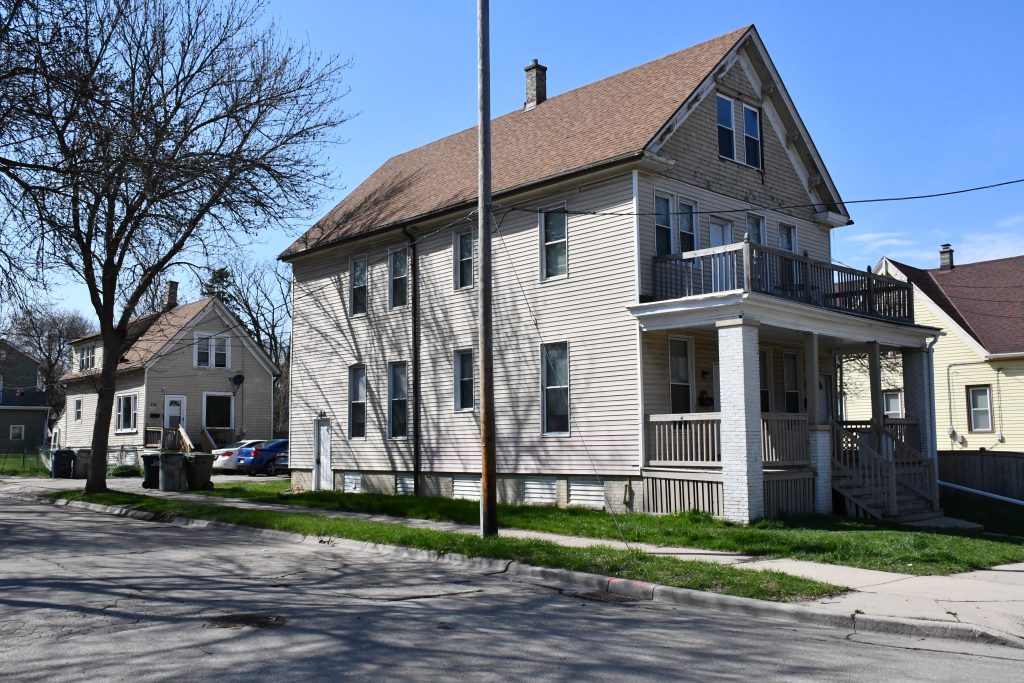Committee Waters Down Proposed ‘Granny Flat’ Plan
Result: The sponsors of proposal have now become the opponents.

House and Carriage House at 3401-3403 N. 1st St.
Photo taken April 23, 2025 by Jeramey Jannene. All Rights Reserved.
Milwaukee’s attempt to legalize “accessory dwelling units (ADUs),” commonly called carriage units, rear cottages or granny flats, earned a key endorsement Tuesday, but only after its more tepid supporters were able to water down the proposal.
It has set up a scenario where the council’s four most vociferous ADU proponents now want to drown the legislation.
Across the country, cities have moved to re-legalize the housing style that has been largely forgotten and permit a “gentle density” increase as one of several strategies to address a national housing crisis. ADUs are viewed as a way to provide inter-generational housing for families, more housing in the most in-demand neighborhoods and affordable living options. Milwaukee has hundreds of ADUs already, but virtually all of them are at least 100 years old, predating the city’s zoning code.
“We know there is demand presently,” said Department of City Development Deputy Commissioner Sam Leichtling to the Zoning, Neighborhoods & Development Committee Tuesday. “And we also know it will provide housing options as we continue to grow in the future.”
But despite apparent agreement amongst the council members that more housing is desirable, and that, based on experiences in cities like Minneapolis and Wauwatosa, only a few dozen units are likely to be built in the coming years, the legislation keeps getting more restrictive.
The two lead sponsors, José G. Pérez and Robert Bauman, effectively halted their own proposal on the council floor in April over a desire to tweak language around single-family zoning districts, including one near UW-Milwaukee, and technical concerns.
“One of the most restrictive ADU ordinances on the books,” said Pérez, the council president, on Tuesday in encouraging the committee to adopt what was considered a technical amendment to the definition of single-family homes and return the ordinance to the council for approval. The proposal includes requirements on siting, size and that the applicant must be an owner-occupant at the time a permit is pulled.
But on a series of divided votes, Ald. Scott Spiker got a substantial additional protection added Tuesday.
As a result, Bauman and Pérez are now objecting to the proposal and the two other sponsors, JoCasta Zamarripa and Peter Burgelis, have bailed. Leichtling also raised concern that Spiker’s amendment would have a “chilling effect” on ADU adoption of a style that the deputy commissioner previously said was the least costly to develop.
The ordinance would permit the development of detached ADUs, the type of historic ADUs currently found across Milwaukee, as well as internal units, such as basement or attic conversions, and attached units, such as a rear addition to a house, in virtually every residential property in the city, as long as design and siting guidelines were met.
Spiker’s amendment would require Board of Zoning Appeals approval for internal ADUs in single-family zoned areas. He said without the restriction the proponents were trying to “smuggle in through the back door, as it were, or the accessory door” a redefinition of single-family housing that would have residents of his south side neighborhood looking to move to the suburbs.
The city’s RS1 through RS6 designations, used for single-family housing, primarily apply to the city’s newer homes, mostly located north of Capitol Drive and west of 60th Street on the northwest side, south of Oklahoma Avenue on the southeast side and southwest of Jackson Park on the southwest side. But it also includes the area around UW-Milwaukee, where opposition to the broader Growing MKE plan became a campaign issue in the recent aldermanic race.
“I’m not saying you couldn’t do it, but you would have to go through a review process that involves the alderman,” said Spiker. “My concern is an internal ADU would be essentially turning this into a duplex.” He also said that the internal ADUs could create short-term rental housing used on platforms like Airbnb.
But Bauman and Pérez said that, based on the experience in other cities and the city’s own enforcement of the building code, it would be unlikely many homeowners of single-family homes would go through with conversions unless the house was already set up for it. Furthermore, they said the council could also adjust the legislation to ban it if it became a problem.
“I think the concerns raised are real, but I think they are going to be very minimal in reality,” said Bauman.
Zamarripa and Leichtling raised concerns that requiring BOZA approval could halt many projects from moving forward.
“His argument does represent NIMBYism in my opinion,” said Zamarripa, suggesting Spiker’s was raising a “Not In My Backyard” concern. “A constituent is going to have to pay tremendous upfront fees… and then they have to go before BOZA and they run the risk of getting overrun by the dreaded aldermanic privilege.” She said the internal ADUs were going to be costly, but still the most affordable to develop.
Spiker said BOZA often rules against the area council member. “The argument ‘not in my backyard’ is irrelevant here, because you can have an ADU in your backyard,” he said of one option that would still be legalized.
Leichtling said that in addition to the costs of design and the possibility of denial, the fact that BOZA special use approvals are time-limited could discourage people who might fear that their use could be later rejected.
“It’s a hurdle that ensures that level of transparency,” said Spiker. That argument swayed Ald. Russell W. Stamper, II, who has sought ways for more notice and involvement for constituents in zoning changes and cast the deciding vote to kill Spiker’s amendment before voting for a less restrictive version offered by Spiker. Ald. DiAndre Jackson also supported the proposal.
The final version of Spiker’s amendment was adopted on a 3-2 vote, with Bauman and Milele A. Coggs in opposition. A vote to send the revised ordinance to council for approval was passed 3-1-1, with Bauman in opposition and Coggs abstaining without explanation.
The other council members that attended the meeting are not zoning committee members and could not formally vote. But their comments indicate a divided vote on the council floor could be forthcoming next week.
What comes out of the full council meeting could be even more confusing than what has happened to date.
On the council floor in April, Bauman floated an even more restrictive amendment than Spiker’s and ended up halting something that appeared to be likely to pass. But on Tuesday, Bauman and Pérez returned with an amendment that said a single-family home was still a single-family home if it contained an ADU and dropped their discussion of a more restrictive change and argued against Spiker’s change.
Legislation Link - Urban Milwaukee members see direct links to legislation mentioned in this article. Join today
If you think stories like this are important, become a member of Urban Milwaukee and help support real, independent journalism. Plus you get some cool added benefits.
More about the Growing MKE proposal
- Milwaukee Seeks ‘Missing Middle’ Housing Developers - Jeramey Jannene - Nov 24th, 2025
- Milwaukee Aims To Build ‘Missing Middle’ Housing in 2026 - Jeramey Jannene - Oct 29th, 2025
- Despite Its Passage, ‘Growing MKE’ Still Not A Done Deal - Jeramey Jannene - Sep 16th, 2025
- Mayor Signs Housing Legislation, Praises Late Jonathan Brostoff - Jeramey Jannene - Jul 16th, 2025
- Council Adopts Growing MKE Plan - Jeramey Jannene - Jul 15th, 2025
- After Lengthy Debate, Council Legalizes Carriage Homes - Jeramey Jannene - Jul 15th, 2025
- Housing Plan Wins Key Council Committee Endorsement - Jeramey Jannene - Jul 9th, 2025
- City Hall: Committee Waters Down Proposed ‘Granny Flat’ Plan - Jeramey Jannene - Jun 17th, 2025
- Madison Pursuing Its Own Zoning Reform Similar To ‘Growing MKE’ - Sarah Lehr - Jun 12th, 2025
- ‘Growing MKE’ Proposal Picks Up Key Endorsement - Jeramey Jannene - Jun 2nd, 2025
Read more about Growing MKE proposal here
Political Contributions Tracker
Displaying political contributions between people mentioned in this story. Learn more.
- April 23, 2019 - JoCasta Zamarripa received $100 from Peter Burgelis
- May 5, 2015 - José G. Pérez received $100 from JoCasta Zamarripa



















